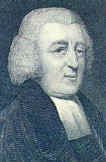 |
|
|
|
 |
|
|
|
| A Member's Bulletin Board. In most cases items posted here originated as email, except as noted. As a Member you are free to submit items to post here. Send to webmaster) | |
| Who Am I? | |
 I was born in 1725, and I died 1807. The only godly influence in my
life, as far back as I can remember, was my mother, whom I had for only
seven years. When she left my life through death, I was virtually an
orphan.
I was born in 1725, and I died 1807. The only godly influence in my
life, as far back as I can remember, was my mother, whom I had for only
seven years. When she left my life through death, I was virtually an
orphan.
My father remarried and sent me to a strict military school,
where the severity of discipline almost broke my back. I couldn't stand
it any longer, and left in rebellion at the age of ten. I did that until my
days in the military service, where again discipline worked hard against
me, but I further rebelled. My spirit would not break, and I
became increasingly more and more a rebel. Because of a number of things
that I disagreed with in the military, I finally deserted, only to be
captured like a common criminal and beaten publicly several times. Somehow, through a process of events, I got in touch with a
Portuguese slave trader, and I lived in his home. His wife, who was
brimming with hostility, took a lot out on me. She beat me, and I ate
like a dog on the floor of the home. If I refused to do that, she would
whip me with a lash. One time I opened some crates of rum and got everybody on the crew drunk. The skipper, incensed with my actions, beat me, threw me down below, and I lived on stale bread and sour vegetables for an unendurable amount of time. He brought me above only to beat me again, and I fell overboard. Because I couldn't swim, he harpooned me to get me back on the ship. I lived with the scar in my side, big enough for me to put my fist into, until the day of my death. back on board, I was inflamed with fever and enraged with the humiliation. THE GREYHOUND had been thrashing about in the north Atlantic storm for over a week. Its canvas sails were ripped, and the wood on one side of the ship had been torn away and splintered. I wound up again in the hold of the ship, down among the pumps. To keep the ship afloat, I worked along as a servant of the slaves. There, bruised and confused, bleeding, diseased, I was the epitome of the degenerate man.
The sailors had little hope of survival, but they mechanically worked
the pumps, trying to keep the vessel afloat. On the eleventh day of the
storm I was too exhausted to pump, so I was tied to the helm and
tried to hold the ship to its course. From one o'clock until midnight I
was at the helm. I cried out to God, the only way I knew, calling upon His grace and His mercy to deliver me, and upon His son to save me. The only glimmer of light I could find was in a crack in the ship in the floor above me, and I looked up to it and screamed for help. God heard me. Though I continued in my profession of sailing and
slave-trading for a time, my life was transformed. I began a disciplined
schedule of Bible study, prayer, and Christian reading and tried to be a
Christian example to the sailors under my command. Philip Doddridge's The
Rise and Progress of Religion in the Soul provided much spiritual comfort,
and a fellow-Christian captain I met off the coast of Africa guided me
further in my Christian faith. Footnote: A chance reading of Thomas Kempis sowed the
seed of his conversion. It was accelerated by a night spent steering a
waterlogged ship in the face of apparent death. In 1779 Newton left
Olney to become rector of St. Mary Woolnoth in London. His ministry
included not only the London poor and the merchant class but also the
wealthy and influential. William Wilberforce, a member of Parliament and
a prime mover in the abolition of slavery, was strongly influenced by
John Newton's life and preaching. Newton's Thoughts on the African Slave
Trade, based on his own experiences as a slave trader, was very
important in securing British abolition of slavery. Missionaries William
Carey and Henry Martyn also gained strength from Newton's counsel.
|